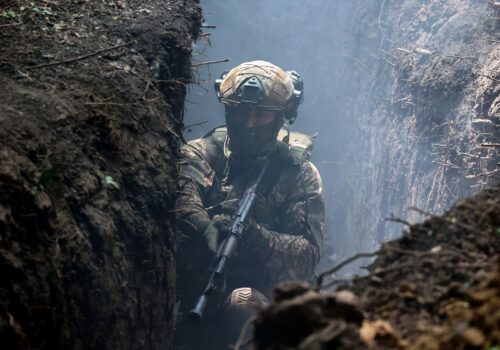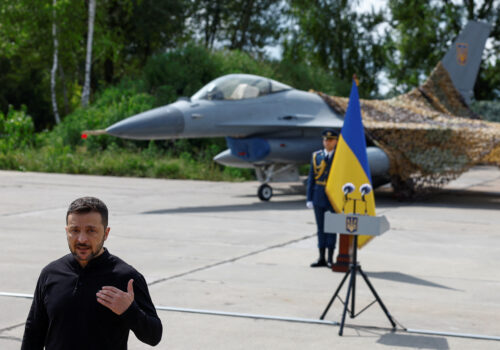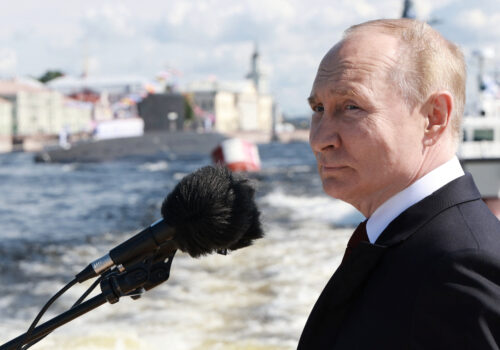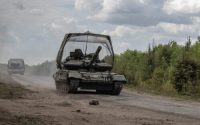Is Ukraine’s raid into Russia a ‘crossing the Delaware’ moment?
Ukrainian forces, on the defensive in eastern Ukraine, have mounted an audacious raid into Russia’s Kursk Province, capturing enemy soldiers and destroying equipment, surprising and discomforting the Kremlin. What strategic significance might it have?
Some raids have no impact on the course of a war. In the summer of 1864, with Union forces besieging Richmond and Petersburg, Confederate General Jubal Early mounted a large and spectacular raid north into Maryland and then southeast into the District of Columbia. Early’s troops stopped just five miles from the US Capitol. It was spectacular but inconsequential, however: The raid distracted the Union command for a few days but made no difference to the outcome of the war.
Other raids do have strategic impact. In 1776, George Washington’s forces had been routed from New York and chased out of New Jersey. Morale was low and political support for the American fight for independence was flagging. In a risky maneuver that December, Washington led a large raid across the Delaware River, surprised enemy forces, and returned to Pennsylvania with captured prisoners and supplies. The raid revived morale and support for the war, demonstrated the Continental Army’s tactical cunning, audacity, and tenacity against a superior foe, and presaged eventual victory.
The raid and the public alarm in Russia it has generated may compel the Kremlin to shift forces from its current offensive in the Donbas region to defend its own territory.
While it is too early to say with certainty, there is at least a case that the Kursk raid more resembles Washington crossing the Delaware than Early’s raid on Washington; namely, that it has strategic significance. In a war in which battlefield transparency is supposedly universal, the Ukrainians achieved surprise, demonstrating Russia’s failure of intelligence and weakness along its border. The attack thus upends the Kremlin narrative of inevitable Russian victory, a narrative that Kremlin propaganda deploys in Europe and the United States to advance its argument that Ukrainian resistance is useless and support for Ukraine is futile. The raid and the public alarm in Russia it has generated may compel the Kremlin to shift forces from its current offensive in the Donbas region to defend its own territory. Certainly, the raid is a morale booster for Ukrainians.
Politically, the raid undercuts the current Russian demand that, as a precondition for negotiations, Ukraine withdraw from all of the territory of the four Ukrainian provinces that Russia partially occupies and claims but does not totally control. The Russians were in effect demanding Ukrainian capitulation as a condition for opening peace negotiations. Even before the raid, the demand that Ukraine withdraw from its territory that Russia has tried but failed to conquer seemed an arrogant overstretch. This demand is now revealed as feckless in the face of Ukraine’s ability not only to limit Russian attacks to marginal advances, but also to launch successful surprise attacks of their own, defending their own land while seizing Russia’s.
It is premature to make final judgments about a raid still in progress. While some military analysts have suggested that the raid seeks to seize and hold Russian territory as a bargaining chip in eventual negotiations, that seems a stretch: Raids are one thing, a full-scale offensive is another. After all, Washington crossed the Delaware to attack exposed Hessian mercenaries. He then retreated back across the Delaware to avoid a full-scale British assault. But, in the end, Washington, with a lot of help from France, won the war. Ukraine’s current raid does not mean that Ukraine will win its war of national survival. It does suggest that Ukraine could win, given the right and timely help from its friends.
Daniel Fried is the Weiser Family distinguished fellow at the Atlantic Council, former US ambassador to Poland, and former US assistant secretary of state for Europe.
Further reading
Thu, Aug 8, 2024
How Ukraine’s incursion into Russia could change the war
Fast Thinking By Atlantic Council
Ukrainian forces launched a surprise raid into Russia’s Kursk region on Tuesday. Our experts explain how this could affect the course of the war.
Thu, Aug 8, 2024
F-16 jets will help defend Ukrainian cities from Russian bombardment
UkraineAlert By Olena Tregub
The first batch of F-16 fighter jets arrived in Ukraine in late July and are now expected to be used primarily in an air defense role against Russian missile and drone attacks, writes Olena Tregub.
Tue, Aug 6, 2024
Russia’s Black Sea defeats get flushed down Vladimir Putin’s memory hole
UkraineAlert By Peter Dickinson
Vladimir Putin’s readiness to flush Russia’s Black Sea naval defeats down the memory hole is a reminder that the Kremlin propaganda machine controls Russian reality and can easily rebrand any retreat from Ukraine, writes Peter Dickinson.
Image: Servicemen of the 126th Territorial Defence Brigade of the Ukrainian Armed Forces attend a military exercise on a river, amid Russia’s attack on Ukraine, in Kherson region, Ukraine July 31, 2024. REUTERS/Ivan Antypenko




